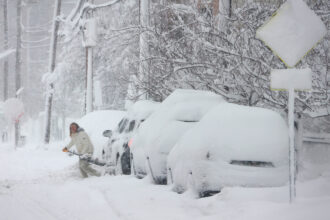WASHINGTON—A remarkably balmy January—the fourth warmest on record—has prompted top Democrats on the House Energy and Commerce Committee to prod Republicans into scheduling a congressional hearing to explore why winters are warmer than average.
Reps. Henry Waxman of California and Bobby Rush of Illinois cited recent data released by the National Oceanic and Atmospheric Administration (NOAA) as the basis for their hearing request.
During January, the average temperature in the United States—excluding Alaska and Hawaii—was 5.5 degrees above normal, according to NOAA.
NOAA reports show that above-normal temperatures are part of a global trend. For example, they pointed to NOAA statistics listing 2001-2011 as ranking among the 13 warmest years worldwide since recordkeeping began in 1880.
In a Wednesday letter addressed to GOP committee leaders, Waxman and Rush wrote that a hearing to discuss these findings would “provide members with a more robust understanding of the scientific consensus around rising temperatures.”
“Denial of basic science is a serious obstacle for action to understand and address global climate change,” Waxman and Rush wrote. “Yet last year during debate on H.R. 910, all Republican members of the Committee voted against a simple amendment that recognized that warming of the climate is occurring.”
Since May 2011, Waxman and his fellow Democrats have made at least seven other requests to Republican leadership for climate-related hearings, according to information provided to InsideClimate News by energy committee spokeswoman Karen Lightfoot. Thus far, none has been granted.
In their letter this week, the two Democrats also pointed to NOAA numbers revealing that the first two months of this winter are the fourth warmest on record, with 22 states experiencing unusually high temperatures.
This swing of warmer-than-normal temperatures was especially evident in the Northern Plains. For instance, temperatures climbed to 71 degrees in Jackson County, S.D., and 61 degrees in Minot, N.D. on Jan. 5. Minnesota temperatures in December and January were 10.1 degrees above average, the warmest such period on record for that state.
Waxman is the ranking Democrat on the Republican-majority energy committee, while Rush is the ranking Democrat on the panel’s subcommittee on energy and power.
They addressed their letter to their energy committee counterparts, Chairman Fred Upton and Rep. Ed Whitfield.
The prospects for the hearing request being granted seem unlikely, but no definitive answer was given by today’s deadline. Spokespeople for Upton didn’t return requests for comment.
About This Story
Perhaps you noticed: This story, like all the news we publish, is free to read. That’s because Inside Climate News is a 501c3 nonprofit organization. We do not charge a subscription fee, lock our news behind a paywall, or clutter our website with ads. We make our news on climate and the environment freely available to you and anyone who wants it.
That’s not all. We also share our news for free with scores of other media organizations around the country. Many of them can’t afford to do environmental journalism of their own. We’ve built bureaus from coast to coast to report local stories, collaborate with local newsrooms and co-publish articles so that this vital work is shared as widely as possible.
Two of us launched ICN in 2007. Six years later we earned a Pulitzer Prize for National Reporting, and now we run the oldest and largest dedicated climate newsroom in the nation. We tell the story in all its complexity. We hold polluters accountable. We expose environmental injustice. We debunk misinformation. We scrutinize solutions and inspire action.
Donations from readers like you fund every aspect of what we do. If you don’t already, will you support our ongoing work, our reporting on the biggest crisis facing our planet, and help us reach even more readers in more places?
Please take a moment to make a tax-deductible donation. Every one of them makes a difference.
Thank you,









